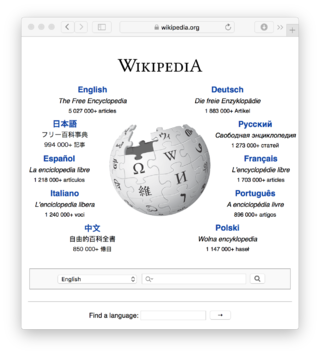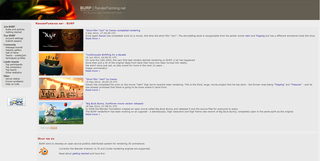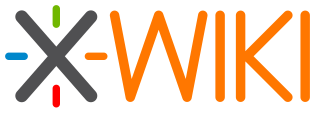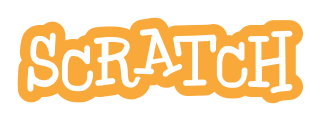
Wiki software, is collaborative software that runs a wiki, which allows the users to create and collaboratively edit pages or entries via a web browser. A wiki system is usually a web application that runs on one or more web servers. The content, including previous revisions, is usually stored in either a file system or a database. Wikis are a type of web content management system, and the most commonly supported off-the-shelf software that web hosting facilities offer.

MediaWiki is free and open-source wiki software originally developed by Magnus Manske for use on Wikipedia on January 25, 2002 and further improved by Lee Daniel Crocker, after which it has since been coordinated by the Wikimedia Foundation. It powers most websites hosted by the Foundation including Wikipedia, Wiktionary, Wikimedia Commons, Wikiquote, Meta-Wiki and Wikidata, which define a large part of the set requirements for the software.

Wikibooks is a wiki-based Wikimedia project hosted by the Wikimedia Foundation for the creation of free content digital textbooks and annotated texts that anyone can edit.
Open-source journalism, a close cousin to citizen journalism or participatory journalism, is a term coined in the title of a 1999 article by Andrew Leonard of Salon.com. Although the term was not actually used in the body text of Leonard's article, the headline encapsulated a collaboration between users of the internet technology blog Slashdot and a writer for Jane's Intelligence Review. The writer, Johan J. Ingles-le Nobel, had solicited feedback on a story about cyberterrorism from Slashdot readers, and then re-wrote his story based on that feedback and compensated the Slashdot writers whose information and words he used.

ConTeXt is a general-purpose document processor. Like LaTeX, it is derived from TeX. It is especially suited for structured documents, automated document production, very fine typography, and multilingual typesetting. It is based in part on the TeX typesetting system, and uses a document markup language for manuscript preparation. The typographical and automated capabilities of ConTeXt are extensive, including interfaces for handling microtypography, multiple footnotes and footnote classes, and manipulating OpenType fonts and features. Moreover, it offers extensive support for colors, backgrounds, hyperlinks, presentations, figure-text integration, and conditional compilation. It gives the user extensive control over formatting while making it easy to create new layouts and styles without learning the low-level TeX macro language.

Big and Ugly Rendering Project (BURP) is a non-commercial volunteer computing project using the BOINC framework for the rendering of 3D graphics that has been in hibernation as of 2020. The project website currently shows the status as "extended maintenance" until 2027.

XWiki is a free wiki software platform written in Java with a design emphasis on extensibility. XWiki is an enterprise wiki. It includes WYSIWYG editing, OpenDocument based document import/export, semantic annotations and tagging, and advanced permissions management.

Mercurial is a distributed revision control tool for software developers. It is supported on Microsoft Windows and Unix-like systems, such as FreeBSD, macOS, and Linux.

The Wikimedia movement is the global community of contributors to the Wikimedia projects, including Wikipedia. This community directly builds and administers these projects with the commitment of achieving this using open standards and software.

Scratch is a high-level block-based visual programming language and website aimed primarily at children as an educational tool, with a target audience of ages 8 to 16. Users on the site, called Scratchers, can create projects on the website using a block-like interface. Projects can be exported to standalone HTML5, Android apps, Bundle (macOS) and EXE files using external tools. Scratch was conceived and designed through collaborative National Science Foundation grants awarded to Mitchell Resnick and Yasmin Kafai. The service is developed by the MIT Media Lab, and has been translated into 70+ languages, and is used in most parts of the world. Scratch is taught and used in after-school centers, schools, and colleges, as well as other public knowledge institutions. As of 15 February 2023, community statistics on the language's official website show more than 123 million projects shared by over 103 million users, over 804 million total projects ever created, and more than 95 million monthly website visits.

Wikivoyage is a free web-based travel guide for travel destinations and travel topics written by volunteer authors. It is a sister project of Wikipedia and supported and hosted by the same non-profit Wikimedia Foundation (WMF). Wikivoyage has been called the "Wikipedia of travel guides".

Uncyclopedia is a satirical online encyclopedia that parodies Wikipedia. Its logo, a hollow "puzzle potato", parodies Wikipedia's globe puzzle logo, and it styles itself as "the content-free encyclopedia", parodying Wikipedia's slogan of "the free encyclopedia". Founded in 2005 as an English-language wiki, the project spans more than 75 languages as well as several subprojects parodying other wikis. The English version has approximately 37,000 pages of content, second only to the Portuguese. Uncyclopedia's name is a portmanteau of the prefix un- and the word encyclopedia.

The history of wikis began in 1994, when Ward Cunningham gave the name "WikiWikiWeb" to the knowledge base, which ran on his company's website at c2.com, and the wiki software that powered it. The wiki went public in March 1995, the date used in anniversary celebrations of the wiki's origins. c2.com is thus the first true wiki, or a website with pages and links that can be easily edited via the browser, with a reliable version history for each page. He chose "WikiWikiWeb" as the name based on his memories of the "Wiki Wiki Shuttle" at Honolulu International Airport, and because "wiki" is the Hawaiian word for "quick".

The Wikimedia Foundation, Inc. (WMF) is an American 501(c)(3) nonprofit organization headquartered in San Francisco, California, and registered as a charitable foundation under local laws. Best known as the hosting platform for Wikipedia, a crowdsourced online encyclopedia, it also hosts other related projects and MediaWiki, a wiki software.

Wikitravel is a web-based collaborative travel guide based on the wiki format and owned by Internet Brands. It was most active from 2003 through 2012, when most of its editing community left and brought their contributions to the nonprofit Wikivoyage guide.
A wiki hosting service, or wiki farm, is a server or an array of servers that offers users tools to simplify the creation and development of individual, independent wikis. Wiki farms are not to be confused with wiki "families", a more generic term for any group of wikis located on the same server.

Fandom is a wiki hosting service that hosts wikis mainly on entertainment topics. The privately held, for-profit Delaware company was founded in October 2004 by Wikipedia co-founder Jimmy Wales and Angela Beesley. Fandom was acquired in 2018 by TPG Inc. and Jon Miller through Integrated Media Co.

Mozilla is a free software community founded in 1998 by members of Netscape. The Mozilla community uses, develops, publishes and supports Mozilla products, thereby promoting exclusively free software and open standards, with only minor exceptions. The community is supported institutionally by the non-profit Mozilla Foundation and its tax-paying subsidiary, the Mozilla Corporation.

Phabricator is a suite of web-based development collaboration tools, which includes a code review tool called Differential, a repository browser called Diffusion, a change monitoring tool called Herald, a bug tracker called Maniphest, and a wiki called Phriction.


















